Filter by
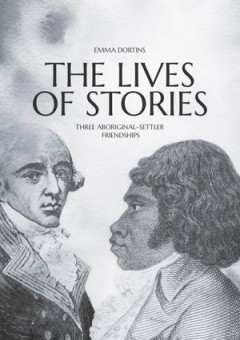
The Lives of Stories: Three Aboriginal-Settler Friendships
The Lives of Stories traces three stories of Aboriginal–settler friendships that intersect with the ways in which Australians remember founding national stories, build narratives for cultural revival, and work on reconciliation and self-determination. These three stories, which are still being told with creativity and commitment by storytellers today, are the story of James Morrill’s adopti…
- Edition
- -
- ISBN/ISSN
- 9781760462406
- Collation
- -
- Series Title
- -
- Call Number
- 994 DOR l
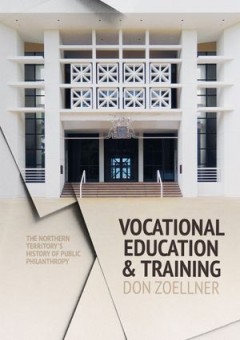
Vocational Education and Training The Northern Territory’s history of publ…
This book represents the first consolidated history of vocational education and training in the Northern Territory. Not only does the story present a chronological account of events, people and institutions, it also offers an explanation of how the system actually works and this has application well beyond the Territory. The mix of historical accounting and operational analysis comes from a uni…
- Edition
- -
- ISBN/ISSN
- 9781760460990
- Collation
- -
- Series Title
- -
- Call Number
- -
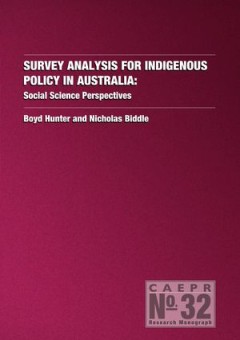
Survey Analysis for Indigenous Policy in Australia: Social Sciences Perspectives
Indigenous policy is a complex domain motivated by a range of social, cultural, political and economic issues. The Council of Australian Governments ‘closing
- Edition
- -
- ISBN/ISSN
- 9781922144188
- Collation
- -
- Series Title
- -
- Call Number
- 301 HUN s
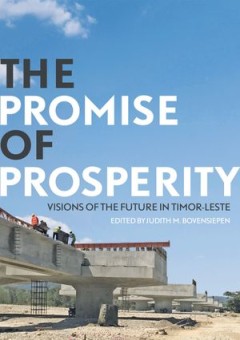
The Promise of Prosperity: Visions of the Future in Timor-Leste
For the people of Timor-Leste, independence promised a fundamental transformation from foreign occupation to self-rule, from brutality to respect for basic rights, and from poverty to prosperity. In the eyes of the country’s political leaders, revenue from the country’s oil and gas reserves is the means by which that transformation could be effected. Over the past decade, they have formulat…
- Edition
- -
- ISBN/ISSN
- 9781760462529
- Collation
- -
- Series Title
- -
- Call Number
- 301 PRO p
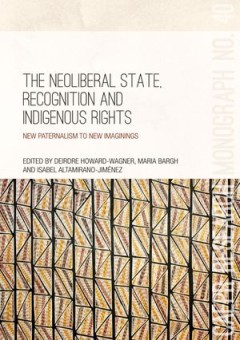
The Neoliberal State, Recognition and Indigenous Rights: New paternalism to n…
The impact of neoliberal governance on indigenous peoples in liberal settler states may be both enabling and constraining. This book is distinctive in drawing comparisons between three such states—Australia, Canada and New Zealand. In a series of empirically grounded, interpretive micro-studies, it draws out a shared policy coherence, but also exposes idiosyncrasies in the operational dynamic…
- Edition
- -
- ISBN/ISSN
- -
- Collation
- -
- Series Title
- -
- Call Number
- 994 NEO n
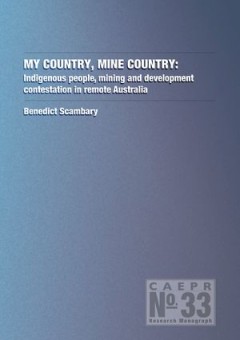
My Country, Mine Country: Indigenous people, mining and development contestat…
Agreements between the mining industry and Indigenous people are not creating sustainable economic futures for Indigenous people, and this demands consideration of alternate forms of economic engagement in order to realise such ‘futures’. Within the context of three mining agreements in north Australia this study considers Indigenous livelihood aspirations and their intersection with sustai…
- Edition
- -
- ISBN/ISSN
- 9781922144720
- Collation
- -
- Series Title
- -
- Call Number
- 340.115 SCA m
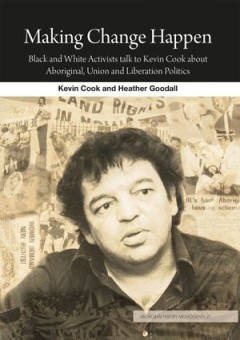
Making Change Happen: Black and White Activists talk to Kevin Cook about Abor…
This book is a unique window into a dynamic time in the politics and history of Australia. The two decades from 1970 to the Bicentennial in 1988 saw the emergence of a new landscape in Australian Indigenous politics. There were struggles, triumphs and defeats around land rights, community control of organisations, national coalitions and the international movement for Indigenous rights. The cha…
- Edition
- -
- ISBN/ISSN
- 9781921666728
- Collation
- -
- Series Title
- -
- Call Number
- 920 GOO m
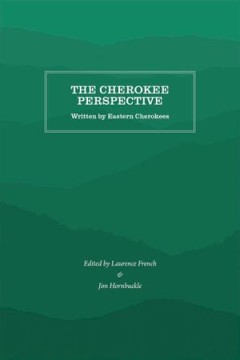
The Cherokee Perspective Written by Eastern Cherokees
In 1973, Cherokee students at the Qualla Boundary started a student organization with the intention of improving the educational prospects among Native Americans attending non-Indian colleges and universities. Under the direction of Laurence French and Charles Jim Hornbuckle, the students interviewed Cherokee elders and received help from the American Indian Historical Society in order to gain …
- Edition
- -
- ISBN/ISSN
- 9781469638515
- Collation
- -
- Series Title
- -
- Call Number
- -

The Cherokee Perspective: Written by Eastern Cherokees
In 1973, Cherokee students at the Qualla Boundary started a student organization with the intention of improving the educational prospects among Native Americans attending non-Indian colleges and universities. Under the direction of Laurence French and Charles Jim Hornbuckle, the students interviewed Cherokee elders and received help from the American Indian Historical Society in order to gain …
- Edition
- -
- ISBN/ISSN
- 9781469638515
- Collation
- -
- Series Title
- -
- Call Number
- 302 FRE c
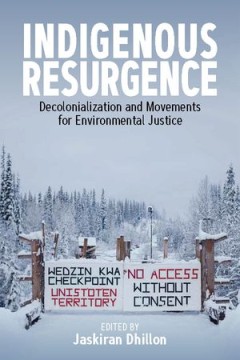
Indigenous Resurgence
From the Standing Rock Sioux Tribe’s resistance against the Dakota Access pipeline to the Nepalese Newar community’s protest of the Fast Track Road Project, Indigenous peoples around the world are standing up and speaking out against global capitalism to protect the land, water, and air. By reminding us of the fundamental importance of placing Indigenous politics, histories, and ontologies …
- Edition
- -
- ISBN/ISSN
- 9781800732452
- Collation
- -
- Series Title
- -
- Call Number
- -
 Computer Science, Information & General Works
Computer Science, Information & General Works  Philosophy & Psychology
Philosophy & Psychology  Religion
Religion  Social Sciences
Social Sciences  Language
Language  Pure Science
Pure Science  Applied Sciences
Applied Sciences  Art & Recreation
Art & Recreation  Literature
Literature  History & Geography
History & Geography